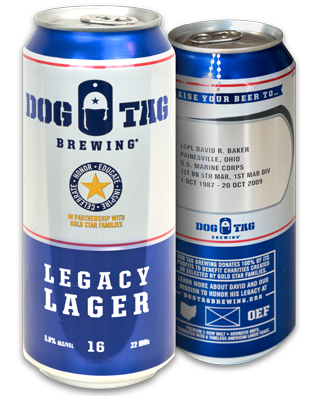It’s an interesting time for one of the biggest craft brewers in the US. Boston Beer’s sales have declined 5 percent during the first half of 2016, dragging its share price down too.
Only in America. In September 2016 Pabst Brewing started distributing Dog Tag Legacy Lager, a beer in cans that pays tribute to America’s fallen soldiers. Dog Tag Lager is different because consumers will be drinking it with purpose, reinventing the toast and reflecting on the dead.
Krones has signed and completed the purchase of 80 percent of the business of Trans-Market Sales & Equipment Inc. Trans-Market is based in Tampa, Florida/USA, and is a proven leader in providing process engineering and automation solutions for the liquid food industry. The company has revenues of approximately USD 30 million and has a workforce of more than 50 employees. The previous owners of Trans-Market will retain a 20 percent ownership. Krones is financing the acquisition with available funds.
With US craft brewers you can always be in for surprises. Greg Koch to all intents and purposes could become the next Walt Disney or Richard Branson (he who founded the Virgin empire) as he already sports three hats: that of brewer, publican and hotelier.
Thinking that streets must be paved with gold and they only needed to collect it, Scottish brewer BrewDog has launched a USD 50 million (EUR 45 million) crowdfunding round in August 2016, this time in the US, to help fund its new brewery in Ohio. It hopes to raise the money in six months.
Stepping up its foray into craft beer, the number two brewer in the US MillerCoors on 11 August 2016 bought into the Texas-based craft brewer Revolver, making it the third such deal announced in less than a month. Revolver was founded in Granbury, Texas, in 2012 by a father and son, Ron and Rhett Keisler.
The partly empty stadiums during the Olympics drove it home again: Brazil is in deep recession. Moreover, per capita beer consumption has been flat for several years at 63 litres and people have taken to drinking beer at home rather than at a bar. Off-premise consumption is 37 percent. This puts AB-InBev’s growth prospects somewhat in danger, considering the clear signs that its strategy, which focused on the on-premise with mainstream brands in returnable glass bottles, no longer seems to move the needle, so to say.
Are they holier than thou? Only hours after Revolver announced that it had been sold to MillerCoors, the Texas Craft Brewers Guild on 11 August 2016 released a new set of requirements defining what it takes to be a member brewery.
This year’s Young Scientists Symposium on Malting, Brewing and Distilling (YSS) took place in the Sierra Nevada Brewing Company in Chico, California, USA, under the overall chairmanship of Prof. Charles W. Bamforth (University of California, Davis). Young scientists from many nations met at the foothills of the Sierra Nevada from April 21st to 23rd in order to present their researches in the area of brewing and distilling technology.
Bye, bye to double digit growth? Craft beer slowed to its lowest growth rate in seven years. During the first six months of 2016, volumes were up 8 percent over the same period last year, says the Brewers’ Association (BA). That’s a big drop from the 13 percent rate craft beer notched in the first half of 2015, and just half the 16 percent expansion it enjoyed in 2014.



